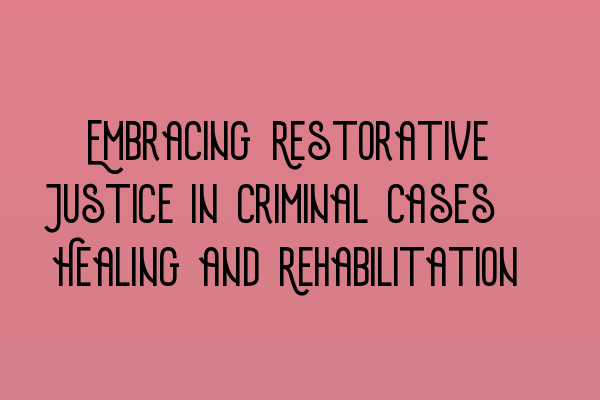Embracing Restorative Justice in Criminal Cases: Healing and Rehabilitation
In the criminal justice system, the traditional approach has predominantly focused on punishment. While punishment plays a significant role in maintaining social order and deterring crime, it often neglects the vital aspects of healing and rehabilitation for all parties involved. Restorative justice provides an alternative framework that aims to address the needs of victims, offenders, and communities, facilitating the healing process and promoting rehabilitation.
Understanding Restorative Justice
Restorative justice is a philosophy that seeks to repair the harm caused by crime by bringing together the offender, the victim, and the community. It focuses on dialogue, accountability, and making amends. Rather than solely punishing the offender, restorative justice aims to address the underlying causes of criminal behavior while empowering victims and reintegrating offenders into society.
By involving victims, restorative justice allows them to express their emotions and share their experiences, promoting healing and closure. Offenders are given an opportunity to understand the consequences of their actions, take responsibility, and actively participate in repairing the harm they caused. The community plays a role in supporting these processes, as their presence encourages accountability and helps rebuild trust.
The Benefits of Embracing Restorative Justice
1. SQE 2 Preparation Courses: Healing for Victims: Restorative justice provides victims with a platform to have their voice heard and their needs addressed. It gives them an opportunity to find closure, achieve emotional healing, and regain a sense of justice that may not be achieved through traditional punishment alone. Victims often report feeling more empowered and supported after participating in restorative justice processes.
2. SQE 1 Preparation Courses: Rehabilitation for Offenders: Restorative justice recognizes that offenders are not defined solely by their criminal actions. By addressing the underlying causes of their behavior and providing them with opportunities for rehabilitation, restorative justice seeks to reintegrate offenders into society as law-abiding individuals. This approach reduces the likelihood of reoffending and promotes positive change.
3. SRA SQE Exam Dates: Community Engagement and Restored Trust: When communities actively participate in restorative justice processes, they become more engaged in the resolution of crime and its impact. By engaging with offenders and victims, communities have the opportunity to rebuild trust, strengthen social bonds, and collectively address the root causes of crime. This involvement can lead to a more harmonious and safer community.
Implementation Challenges and Solutions
While restorative justice offers significant benefits, its implementation faces certain challenges. These challenges include ensuring equal access to the process, establishing supportive frameworks, and managing emotions during the dialogue. Addressing these challenges requires a commitment to training, education, and support for all stakeholders involved.
1. SQE 1 Practice Exam Questions: Training and Education: Professionals within the criminal justice system, including lawyers, judges, and law enforcement officers, should receive comprehensive training on restorative justice principles and practices. This training will ensure a deeper understanding of restorative justice, its benefits, and effective strategies for implementation.
2. SQE 1 Practice Mocks FLK1 FLK2: Victim Support Services: Victims require appropriate support throughout the restorative justice process. Establishing victim support services that offer emotional support and guidance will ensure their needs are met and their participation is meaningful. These services may include counseling, legal advice, and assistance with navigating the justice system.
Conclusion
Embracing restorative justice in criminal cases offers a transformative approach that prioritizes healing and rehabilitation. By involving victims, offenders, and communities in a collaborative process, restorative justice promotes accountability, addresses the harms caused by crime, and contributes to a safer and more just society.
If you want to learn more about restorative justice or explore other legal topics, check out our related articles:
